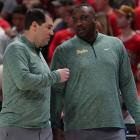
I wrote a column earlier this week about a little-known rule that prevents SEC progams from recruiting a certain type of prospect -- specifically an academic non-qualifier who subsequently graduates from a junior college without spending at least three semesters at the junior college from which the prospect ultimately earns an associate degree.
Shortly after posting the column, I heard from two former SEC coaches who claimed that rare restriction absolutely cost them prospects. Shortly after posting the column, I was asked (privately and on social media) three questions from lots of people:
- How long has this rule been in place?
- Why did the SEC put this rule into place?
- Are there any plans to lift the recruiting restriction?
Good questions, all of them.
So I called the SEC office and got the answers.
Greg Sankey, executive associate commissioner of the SEC, told me that the rule was implemented in 1993 and has been modified twice -- first in 2008, then again in 2012. But the gist of the rule has forever been what I described in the column, and the reason behind it is that the SEC determined long ago that non-qualifiers who become JUCO-to-JUCO transfers simply do not go on to graduate at the four-year level with much frequency.
"Over time we've learned the graduation rate at the four-year level diminishes greatly the more frequently an individual transfers, and [prospects] at the junior-college level [who are] non-qualifiers are very much negatively impacted by those transfers when they're looking to graduate [at the four-year level]," Sankey said. "The rates are extremely low."
(To Sankey's point, it should be noted that Jae Crowder -- the JUCO-to-JUCO transfer from Georgia referenced in this week's column as a prospect the rule prevented SEC programs from pursuing in 2009 -- never actually graduated from Marquette even though he played two seasons for the Golden Eagles, a Marquette official confirmed early Thursday.)
Beyond that explanation from Sankey, multiple sources told me that, back in the early 90s, well before Sankey joined the league, the SEC believed some of its programs were manipulating the junior college system, and this rule was designed to help stop that. On some level, it undeniably has. But it's still a wildly unpopular rule with SEC coaches, and I'm told all 14 men's basketball coaches would vote to lift the restriction if it were put to a vote.
I asked Sankey if he agrees with that assessment.
"I won't project what the vote might be," he said. "But my intuitive sense doesn't disagree."
That said, don't expect the restriction to be lifted any time soon -- mostly because that type of thing is decided by presidents and chancellors, not coaches. And though the rule predates the APR and was thus never designed to help SEC schools avoid APR issues, there's some thought that the rule is doing exactly that now, which is among the reasons it'll likely remain in place for the foreseeable future.
"[The coaches'] feedback is important and considered," Sankey said. "[But the rule] is not something that's necessarily ripe for change at the present time."




















